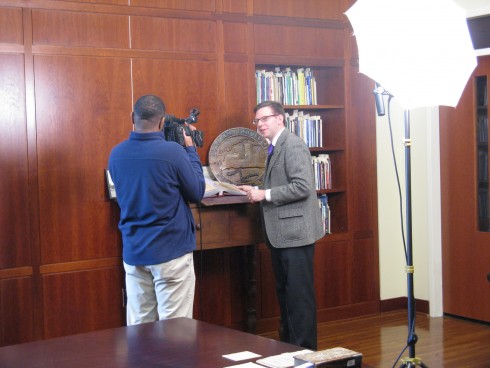
FURMAN UNIVERSITY PROFESSORS, HISTORIANS WEIGH IN FOR C-SPAN’S “CITIES TOUR” FEATURING GREENVILLE
Coverage airs on C-SPAN’s “Book TV” and “American History TV” Feb. 20-21
GREENVILLE, S.C.—C-SPAN, a public affairs network with more than 100 million viewers, will feature the City of Greenville as part of its “2016 Cities Tour.” Contributing significantly to the series are Furman University historians and professors. Greenville is one of only 24 cities nationally to be highlighted for this year’s series.
C-SPAN, in partnership with Charter Communications and the City of Greenville, will feature the literary life and history of Greenville on the network’s Book TV on CSPAN-2 and American History TV on CSPAN-3. The various segments will be broadcast throughout the weekend of Feb. 20-21. Once aired, the segments may also be viewed online.
For the programs, C-SPAN interviewed Jeffrey Makala, Furman Duke Library, Special Collections and Archives; political science professors James Guth and Akan Malici; and Courtney Tollison, history professor and, previously, Founding Historian for the Upcountry History Museum-Furman University. Many others were interviewed for the multi-segment program including Mayor Knox White, local historian Judy Bainbridge, representatives from Upcountry History Museum-Furman University, and other Greenville experts and civic leaders.
Jeffrey Makala delved into Furman’s rich archives to showcase those with local and national significance. He chose writings from the Baptist Historical Collection which, he says, contains many “hidden gems of American History.”
The production crew filmed Makala showing 18th and 19th century manuscripts and letters that speak to larger issues in American History—slavery, the American Revolution, the role of women, secession, and the literary culture. Of the Baptist Historical Collection, he says, “It’s not just dusty old church records … there are snippets of deep historical value …”
One of the items in the collection dating to the 1830s is a notebook documenting James Furman’s work as a traveling minister. In it are records of slave baptisms—their names, who owned them, and the dates and locations of the baptisms. In another speech manuscript dated 1860, James Furman rallies support for secession with “some pretty fiery rhetoric,” says Makala.
The C-SPAN crew also tapped the historical knowledge of Dr. Courtney Tollison who will be featured in two segments. She spoke about her book, World War II and Upcountry South Carolina: “We Just Did Everything We Could”, and on the ways Greenville contributed to and was affected by the Cuban Missile Crisis.
She says, “The contributions of this area to the World War II effort and the impact of Major Anderson’s death on the Cuban Missile Crisis are local stories with national and international significance, and I appreciated the opportunity to make a national audience more aware of these momentous aspects of our local history …”
Covering the non-fiction literary scene in Greenville, C-SPAN interviewed political science professor Dr. Akan Malici who spoke about the book he coauthored, U.S. Presidents and Foreign Policy Mistakes. In it, he and Stephen Walker explain the limits of military power. Malici says, “Military power is a crude tool with lots of unforeseeable consequences which inevitably escape our control…Our leaders must be much more prudent in the use of military power than they often have been.”
C-SPAN producers turned their attention to political science professor Dr. James Guth and a book he co-edited, The Oxford Handbook of Religion and American Politics. Guth touched on the history of the book project and how the volume changed how we view American politics. He also discussed religion and its influences on electoral politics, voting in Congress, American attitudes about foreign policy, and judicial decisions.
Says Guth, “We moved to the current election season and to South Carolina …, discussing the ways in which religious and other factors might influence the current Republican and Democratic nominating contexts. We also talked about the lessons that we might learn from studying the role of religion in American political life, both positive and negative.”
More information about C-SPAN’s “Cities Tour” may be found at www.c-span.org. Or contact the Furman News and Media Relations Office at (864) 294-3107.
